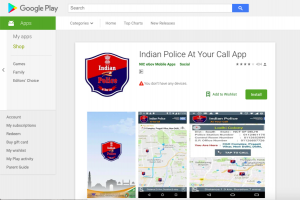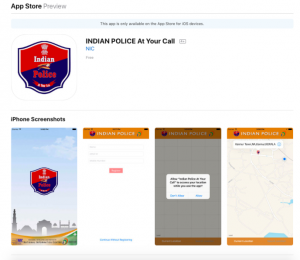Bail is the temporary release of a person accused of a crime, by the court. The Court allows the accused person to be outside the jail on a condition that they would appear before the Court whenever required and will not commit any crimes. In most cases where bail is granted, a sum of money or property has to be deposited to the Court as a guarantee that the person makes an appearance back in Court whenever they are required.
Theme: Police
Driving Without A License
While driving, it is mandatory to keep a copy of a valid Driving License with you at all times1, and present it to a police officer on demand2. Now, you can also carry an electronic copy of your driving license in the DigiLocker or mParivahan app3. If you hold a valid driving license but do not have it when an officer asks you to produce it, you may be punished with a fine between Rs. 500 and Rs. 1,0004. You may alternatively produce it to the officer/authority who has asked you for it, within a stipulated time period, which varies across states5.
If your license has been submitted to or seized by, governmental authority or officer, then you must produce a receipt or any other form of acknowledgement, and produce the license within a stipulated time period that varies across states2.
If you drive a vehicle and you do not possess a driving license or have not attained the required age to drive it, then your vehicle can be seized and detained by a police officer6. Furthermore, you can be punished with a fine of Rs. 5,000 or with jail time of up to 3 months, or both7.
The applicable fine amount might vary across states. Given below are the fine amounts of different offences for two states.
| State | Type of Vehicle | Fine Amount (In INR) |
| Delhi | Not applicable | 5,000 |
| Karnataka | Two/Three-Wheeler | 1,000 |
| Light Motor Vehicle | 2,000 | |
| Others | 5,000 |
- Section 6(3), Motor Vehicles (Driving) Regulations, 2017. [↩]
- Section 130(1), The Motor Vehicles Act, 1988. [↩] [↩]
- Section 139, Central Motor Vehicles Rules,1989. [↩]
- Section 177A, The Motor Vehicles Act, 1988. [↩]
- Section 130(4), The Motor Vehicles Act, 1988. [↩]
- Section 207(1), The Motor Vehicles Act, 1988. [↩]
- Section 181, The Motor Vehicles Act, 1988. [↩]
Right to Bail
You have a right to bail. This right can be directly exercised in the case of bailable offences. For non-bailable offences, this right is dependent on the discretion of the court.
The rationale of giving bail is that, if there is no substantial risk of the accused fleeing, then there should be no reason why he should be imprisoned. Granting bail usually comes at an early stage.
The Court takes into account your gender, health and age while granting you bail. The Court may grant you bail more easily if you fall in the category of the following sets of persons:
- Women
- Children below the age of sixteen
- Sick and Infirm people
Police Arrest With Warrant
An arrest is when a person is physically detained by the police. No person can be detained by the police without being informed of the reasons and the basis in law for their arrest.
Generally, the police need a warrant to arrest someone. Crimes for which a warrant is required are called non-cognizable offences. On receiving information of a non-cognizable crime, the police must take permission from the Magistrate to arrest someone. This permission from the Magistrate is known as a warrant.
Who can file an FIR
You can file an FIR if you are:
- A victim of a crime.
- A relative or friend or acquaintance of the victim.
- You have knowledge about a crime that has taken place or is about to take place.
It is not necessary that you must have all information about the crime in order to file an FIR. But it is important that you report everything you know to the police.
An FIR in itself is not a criminal case filed against someone. It is just information received by the police relating to the commission of a crime. A criminal case begins when the chargesheet is filed by the police before the Court and a Public Prosecutor is appointed by the State.
Driving a vehicle without a registration
It is mandatory to register motor vehicles before driving them1, and after getting your vehicle registered, you will receive a Registration Certificate (RC) (( Section 41, The Motor Vehicles Act, 1988.)). It is mandatory to carry the original copy or electronic copy of the RC and to display a registration mark on your vehicle2.
If you drive or allow a motor vehicle to be driven without registration, you can be punished with a fine between Rs. 2,000 to 5,000 for the first offence, and with jail time of up to 1 year, or a fine between Rs. 5,000 and 10,000, or both, for any subsequent offence3. The applicable fine amount might vary across states.
You cannot be fined for not having the Registration Certificate only for the following reasons4:
- Conveyance of persons suffering from sickness or injuries
- Transport of food or materials to relieve distress or of medical supplies
However, you must inform the Regional Transport Authority (RTA) of your state within 7 days that you are using a motor vehicle for the two reasons given above, otherwise you can be fined.
Given below are the fine amounts for two states:
| State | Frequency of Offence | Fine Amount (In INR) |
| Delhi | First offence | 2,000 – 5,000 |
| Any subsequent offence | 5,000 – 10,000 | |
| Karnataka | Two/Three-Wheeler | 2,000 |
| Light Motor Vehicle
|
3,000 | |
| Medium/Heavy Vehicle and Others | 5,000 |
Understanding Bail
Bail is when an accused assures the police that he will not run away or commit any more crimes if he is released into society. Thus, bail is usually through a :
- Bail Bond
A bail bond is the money that a person must deposit with the court when they have been granted bail. It is to make sure that the person does not run away. The amount might be less or more, depending upon the nature of the crime. In case you don’t have money, your property can be attached to get bail. This deposit of money or attachment of property is mandatory for bail. The Court may ask the person to not leave the territory of the country and report to the court whenever he is required to do so under the Bond.
- Personal Bond
In certain cases, while granting a person bail, the Court may not ask them to submit a bail bond, but instead release them on their own promise, or what is commonly known as a personal bond. Bail can be granted on a personal bond either with or without sureties. Courts have discretion in the matter so they may release the accused by taking only a personal bond without insisting for a surety.
- Surety
When you approach the court for bail, sometimes the court wants sufficient guarantees to ensure you won’t run away. The court may ask you to get some people to take this responsibility. The same person does not have to always remain a surety. A person acting as a surety can apply to be ‘discharged’ from their position of a surety. In such a circumstance, you will need to replace the surety. You will need to get another person to the Court to sign as your new surety. If you can’t replace the surety, you will be taken into custody.
Informing Friends and Family
When you are being arrested, before taking you away, you can choose a person (friend or family member) whom the police must inform about your arrest. If the arrested person’s friends or family live in a different district or town, the police must notify them of :
- the time of arrest
- place of arrest
- where the arrested person is being held
The police can notify the relative or friend through the Legal Aid Organisation in the district and the police station of that area within a period of 8 to 12 hours after the arrest.
How to file an FIR
If a crime has taken place:
- Go to the nearest police station: The police station does not necessarily have to be in the area where the crime has been committed. Please download the ‘Indian Police at your call’ app to find the nearest police station.
For Android Users:
https://play.google.com/store/apps/details?id=in.nic.bih.thanalocator&hl=en

For Apple Users:
https://itunes.apple.com/in/app/indian-police-at-your-call/id1177887402?mt=8

When you go to the police station to file the FIR, the following happens:
- You will be directed to the Duty Officer. You can either verbally tell the officer what happened, or write down the details yourself. If you tell the police verbally, then they must write it down.
- The Duty Officer will then make an entry in the General Diary or Daily Diary.
- If you have a written complaint with you, please carry two copies and give them to the Duty Officer. Both will be stamped and one will be returned to you. The stamp bears a Daily Diary Number or DD No. and is proof that they received your complaint.
- Once the police have read it out, if all the details are correct, you can sign the FIR. You have the right to get a copy of the FIR for free. Note the FIR number, date of FIR and the name of the police station. In case you lose your copy, you can use these details to access the FIR online for free.
After registering the FIR, the contents of the FIR cannot be changed. However, you can give additional information to the police later on at any point.
In some states and cities, certain kinds of FIRs and complaints can be registered online. For example, in Delhi an online complaint can be filed for cases of missing persons or children, unidentified children or persons or dead bodies, senior citizen registration, stolen or unclaimed vehicle search or missing stolen mobile phones.
Driving a vehicle without a PUC Certificate
It is mandatory for all motor vehicles, except motorcycles of engine capacity less than 70 cc, to have a Pollution Under Control Certificate (PUC)1. This certificate indicates that the emissions from your vehicle are under control, and in accordance with the law. This PUC certificate can be easily obtained from any certified pollution check centre, which is present at petrol pumps and car repair shops.
You must get a PUC Certificate for your vehicle within a year of the registration2 of that vehicle, and it is mandatory to carry this certificate in your vehicle, and must be presented when asked for by a police officer2. A PUC Certificate is only valid for a limited period of time, and it is important that you renew your PUC certificate before it expires, otherwise, you will be fined.
If you do not have a PUC certificate, you will be punished with a fine of at least Rs. 500 for the first offence, and a fine of at least Rs. 1,500 for every subsequent offence3. The applicable fine amount might vary across states.
Given below are the fine amounts for two states:
| State | Frequency of Offence | Fine Amount (In INR) |
| Delhi | First offence | 500 |
| Any subsequent offence | 1,500 | |
| Karnataka | First offence | 500 |
| Any subsequent offence | 1,000 |